A Cyclops is a one-eyed monster in Greek mythology.
Check or cheque, may refer to:
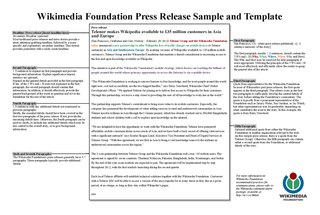
A press release is an official statement delivered to members of the news media for the purpose of providing information, creating an official statement, or making an announcement directed for public release. Press releases are also considered a primary source, meaning they are original informants for information. A press release is traditionally composed of nine structural elements, including a headline, dateline, introduction, body, and other components. Press releases are typically delivered to news media electronically, ready to use, and often subject to "do not use before" time, known as a news embargo.

Checked baggage is luggage delivered to an airline or train for transportation in the hold of an aircraft, storage on a coach bus or baggage car of a passenger train. Checked baggage is inaccessible to the passenger during the flight or ride, as opposed to carry-on baggage.
The Montreal Convention is a multilateral treaty adopted by a diplomatic meeting of ICAO member states in 1999. It amended important provisions of the Warsaw Convention's regime concerning compensation for the victims of air disasters. The Convention attempts to re-establish uniformity and predictability of rules relating to the international carriage of passengers, baggage and cargo. Whilst maintaining the core provisions which have served the international air transport community for several decades, the treaty achieves modernization in a number of key areas. It protects passengers by introducing a two-tier liability system that eliminates the previous requirement of proving willful neglect by the air carrier to obtain more than US$75,000 in damages, which should eliminate or reduce protracted litigation.

A trackless train — or tram, road train, land train, or parking lot train is a road-going articulated vehicle used for the transport of passengers, comprising a driving vehicle pulling one or more carriages connected by drawbar couplings, in the manner of a road-going railway train. Similar vehicles may be used for transport of freight or baggage for short distances, such as at a factory or airport. Often depending on use, land train may or may not be skeuomorphically styled to look like traditional, often steam trains.

A combine car in North American parlance, most often referred to simply as a combine, is a type of railroad car which combines sections for both passengers and freight.
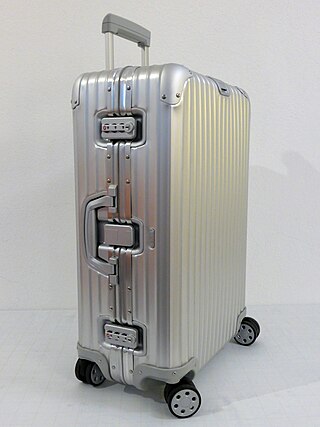
Baggage or luggage consists of bags, cases, and containers which hold a traveler's personal articles while the traveler is in transit. A modern traveler can be expected to have packages containing clothing, toiletries, small possessions, trip necessities. On the return trip, travelers may have souvenirs and gifts. For some people, luggage and the style thereof is representative of the owner's wealth and status. Luggage is constructed to protect the items during travel either with a hard shell or a durable soft material. Luggage often has internal subdivisions or sections to aid in securing items. Handles are typically provided to facilitate carrying, and some luggage may have wheels and/or telescoping handles or leashes to make moving them easier.
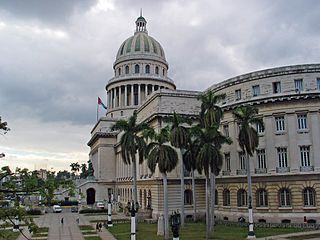
The United States embargo against Cuba has prevented U.S. businesses from conducting trade or commerce with Cuban interests since 1958. Modern diplomatic relations are cold, stemming from historic conflict and divergent political ideologies. U.S. economic sanctions against Cuba are comprehensive and impact all sectors of the Cuban economy. It is the most enduring trade embargo in modern history.

The term hand luggage or cabin baggage refers to the type of luggage that passengers are allowed to carry along in the passenger compartment of a vehicle instead of a separate cargo compartment. Passengers are allowed to carry a limited number of smaller bags with them in the vehicle, which typically contain valuables and items needed during the journey. There is normally storage space provided for hand luggage, either under seating, or in overhead lockers. Trains usually have luggage racks above the seats and may also have luggage space between the backs of seats facing opposite directions, or in extra luggage racks, for example, at the ends of the carriage near the doors.
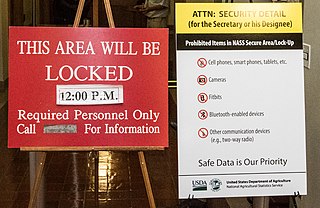
In journalism and public relations, a news embargo or press embargo is a request or requirement by a source that the information or news provided by that source not be published until a certain date or certain conditions have been met. They are often used by businesses making a product announcement, by medical journals, and by government officials announcing policy initiatives; the media is given advance knowledge of details being held secret so that reports can be prepared to coincide with the announcement date and yet still meet press time.
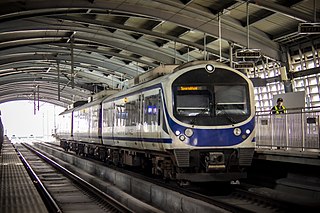
The Airport Rail Link (ARL) is an express and commuter rail line in Bangkok, Thailand. The line provides an airport rail link from Suvarnabhumi Airport, via Makkasan station, to Phaya Thai station in central Bangkok. Most of the line is on a viaduct over the main eastern railway. It is owned by State Railway of Thailand (SRT) and, since 2021, operated by Asia Era One Company Limited. The 28.6-kilometer (17.8 mi)-long Airport Rail Link opened for service on 23 August 2010.
Baggage is any number of bags, cases and containers which hold a traveller's articles during transit.
Pound or Pounds may refer to:
Excess Baggage may refer to:

A baggage sizer, also known as a bag sizer, is a piece of furniture that is used primarily at airport check-in desks and boarding gates to assist and inform passengers and airport ground staff of baggage size limits for personal and cabin luggage or bags.
Stop Bloody Energy project is a global initiative of Ukrainian energy companies aimed at refusing to buy Russian energy resources and cooperating with Russia in the energy sector due to its war against Ukraine. The project was launched by Rinat Akhmetov's private company DTEK and the state-owned companies Naftogaz and Ukrenergo.
This page is based on this
Wikipedia article Text is available under the
CC BY-SA 4.0 license; additional terms may apply.
Images, videos and audio are available under their respective licenses.









